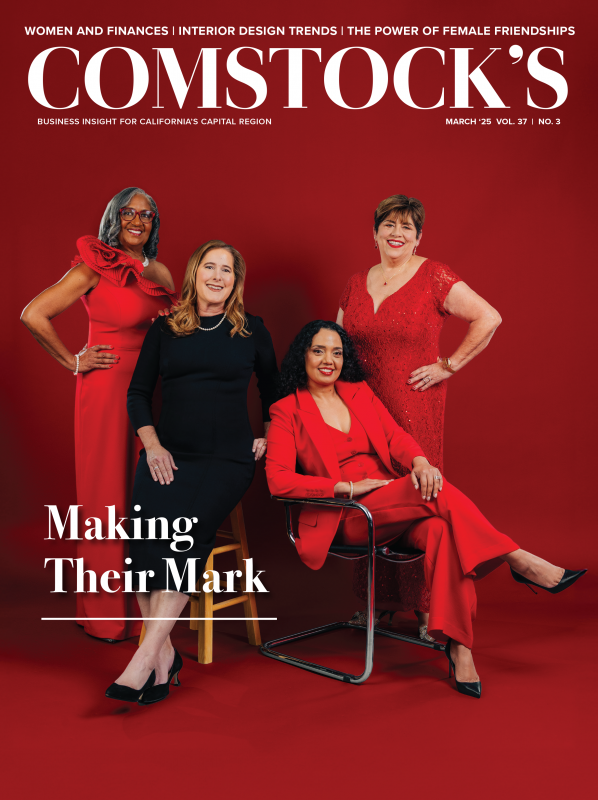Lisa Cardoza knows that college students can need help. She knows this because when she graduated high school as the valedictorian, she walked across the stage while five months pregnant. So when she entered college as a teenage mother, she was grateful for the help and guidance from her family, her teachers, her community and her financial aid officer. “What drives me, even to this day, is that so many people helped me along the way. That always stuck with me,” says Cardoza, president of American River College, who has a doctorate in educational leadership.
Helping students is in Cardoza’s bones. She calls her philosophy “Students first,” and this informs everything she does at ARC, which serves over 30,000 students, making it the sixth largest public two-year college in the nation. The student body is diverse in age (48 percent are over 25) and ethnicity (32 percent Hispanic/Latino), with more than 40 languages spoken. “I fall in love with this place more every single day,” says Cardoza. “When you walk around the campus you hear Russian, you hear Farsi, you see hijabs. It’s so beautiful.”
Favorite to-do list system: “Honestly? I’ve tried a lot of things, and I don’t have a favorite.” Instead she relies heavily on her calendar and administrative assistant.
One thing she does every day: “Finding joy.” This could be a simple thing. She likes to find small pockets of joy, such as the community spirit of a Lunar New Year celebration in the student union. “It really is just being around joyful things.”
6:30-7:00AM – “I’ll admit to snoozing when I can.” She says, laughing. “No one else in this column has ever admitted that! They’re all so structured!” (Fact-check: Cardoza is correct. She’s the first to admit snoozing.)
7:01AM – Checks her phone while in bed; chimes in on family text threads. “We have a mom chat and a sister chat.” She knows her days are jam-packed, so she prioritizes this moment to check in with her loved ones, especially those battling illness.
7:10AM – “I don’t like to exercise; I really, really don’t. But one of the things I’m aware of is how important it is (to) have some sort of de-stressing activity to start the day.” So she does yoga for five to 10 minutes. “That’s all I want to do. That’s all I have time to do.” Skips both breakfast and coffee.
7:53AM – Drives her seven-minute commute to campus. (The short commute is “why I get to snooze.”)
8:00AM – Sync-up meeting with her boss, Los Rios District Chancellor Brian King.
8:30AM – Meets with the other school presidents of the Los Rios District (Cardoza’s counterparts). Topics include enrollment trends, the budget and any potential chaos and confusion from D.C., which often bleeds into the next meeting.
9:00AM – Meets with the district office (the vice chancellors and school presidents). They prep for the next board meeting, which happens monthly. Topics include the budget, how to handle AI, hiring, union issues and now — suddenly — emergencies about the potential loss of federal funding.
11:30AM – Heads to a campus event, such as the opening of a new art exhibition called “The End of Painting,” a retrospective exhibition of paintings by Dan Samborski at ARC’s Kaneko Gallery.
12:00PM – Often she’ll grab a quick bite during a meeting, such as giving updates to a group of the school’s patrons.
1:00PM – More meetings: one-on-ones with her direct reports, often discussing new academic programming under consideration.
2:00PM – Many of her meetings are about hiring new faculty; she personally interviews each candidate.
3:00PM – Dials into the occasional board meeting; she sits on many boards, from Street Soccer USA to the Greater Sacramento Urban League to the Creciente Latinx Leadership (part of the Youth Development Network).
4:00PM – Many of the meetings grapple with how to retain the values of inclusion and diversity in the new political climate. She takes solace in where she lives: “I’m very grateful to be in California,” she says. She notes that, in contrast, the University of Texas at Austin closed their DEI office. “I know that California is going to do everything that we can to protect our values.”
5:00PM – She tries to leave campus by 5:30, but she rarely heads straight home. Sometimes she has board meetings, sometimes campus events, sometimes networking functions (such as American Leadership Forum), sometimes happy hour with friends. “Last week it was drag queen bingo,” she says, laughing. “I don’t like to cook, so anytime someone invites me somewhere I’m like, sure!”
9:00PM – Gets home, spends time with the youngest of her two sons, 19-year-old son Diego. 25-year-old Gabriel will graduate with a master’s degree in psychology from the University of Arizona in May. No TV. Catches up on emails.
11:00PM – Heads to bed — sometimes as late as midnight, which might require a snooze.
–
Stay up to date on business in the Capital Region: Subscribe to the Comstock’s newsletter today.
Recommended For You
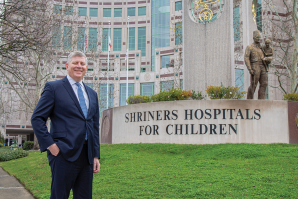
The Way We Work: Kenny Pawlek
A glimpse into the daily life of the administrator at Shriners Children’s Northern California
Pawlek keeps that positive outlook through all aspects of managing the 800-employee operation. One secret to keeping a positive morale: lots of dad jokes.
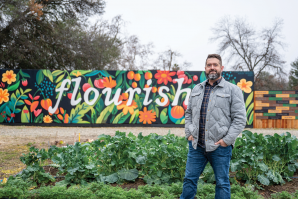
The Way We Work: Brad Squires
A glimpse into the daily life of the CEO of Sacramento Venture Philanthropy, CEO of the Orangevale-Fair Oaks Community Foundation and owner of Heirloom Acres farm
He’s sometimes crunching numbers in Excel, sometimes lugging sacks of potatoes and sometimes feeding hay to his cows. These are all wildly different tasks, but they’re all united by the same principle — giving.

The Way We Work: Lance Hastings
A glimpse into the daily life of the president and CEO of the California Manufacturers & Technology Association
His trick for handling this responsibility? It starts with a coop full of chickens.

The Way We Work: Steve Pleau
A glimpse into the daily life of the CEO of Future Automotive Group
Despite turning 78 this year, Pleau still heads to the office every day to rally the troops, monitor customer satisfaction, and follow his North Star: “My real focus is on expansion,” says Pleau. “I’m not done.”

The Way We Work: Harjinder K. Shergill-Chima
A glimpse into the daily life of the director of the California State Lottery
Under Director Harjinder K. Shergill-Chima’s watch, the lottery (which is self-funded) has an “unheard of” administrative budget that’s just 4 percent of revenue.

The Way We Work: Michael J. Facenda
A glimpse into the daily life of the president of Sky River Casino
Michael J. Facenda oversees 1,600 employees, 14 food outlets, 82 table games and 2,100 slot machines — and don’t forget the pastry shop.
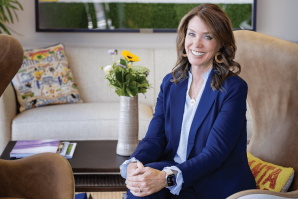
The Way We Work: Caroline Beteta
A glimpse into the daily life of the CEO of Visit California
On paper it’s a dream job of nonstop travel, but the reality is that most days she’s stuck in her office until 7 p.m. Thankfully she has a secret weapon: white space.
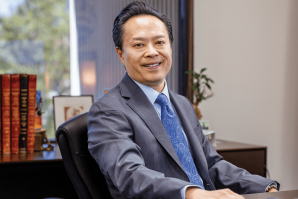
The Way We Work: Thien Ho
A glimpse into the daily life of Sacramento County’s district attorney
Thien Ho oversees 180 attorneys and a budget of $129 million with a purview of prosecuting all misdemeanors and felonies in the county. He starts his day with lots of water.




